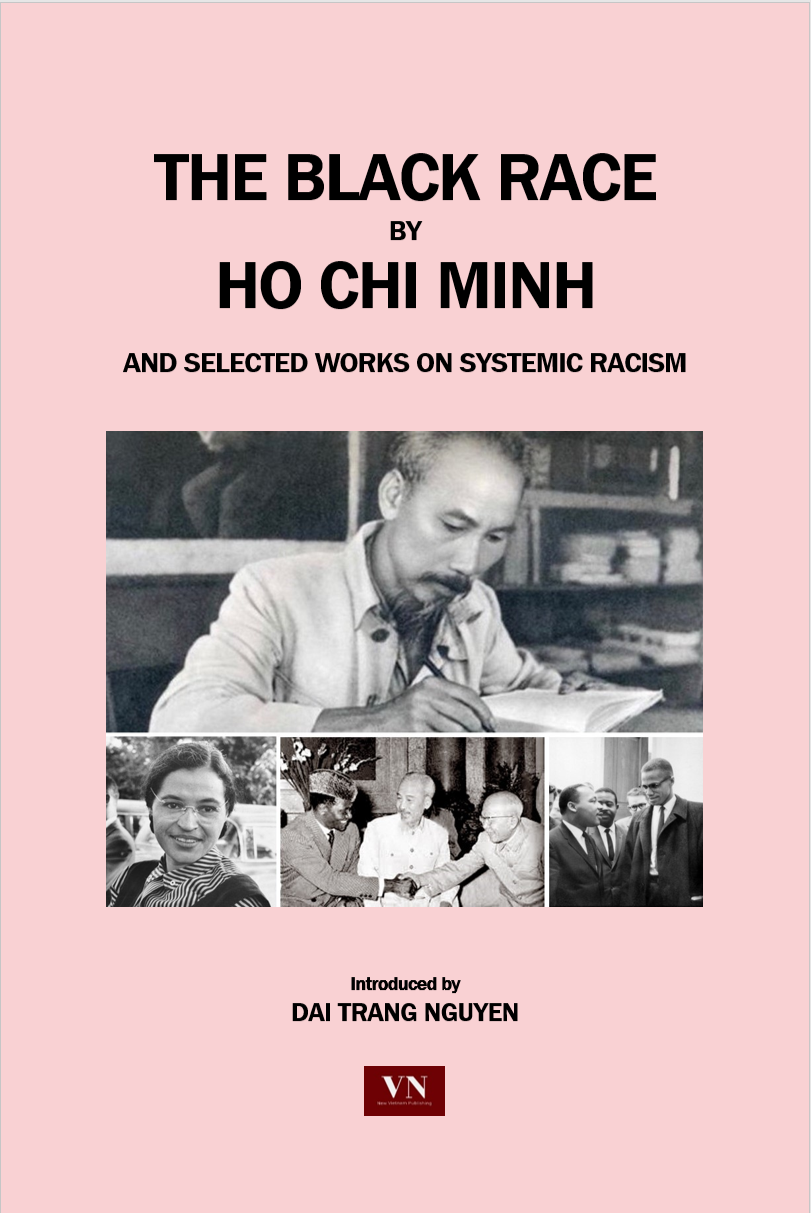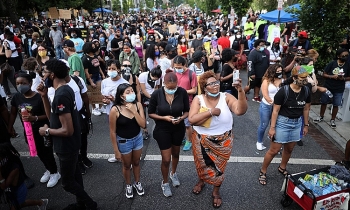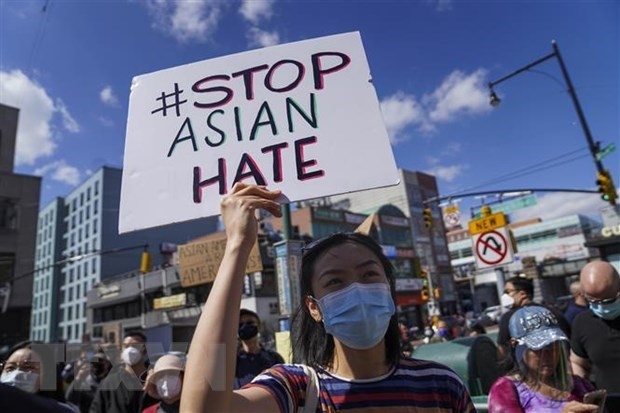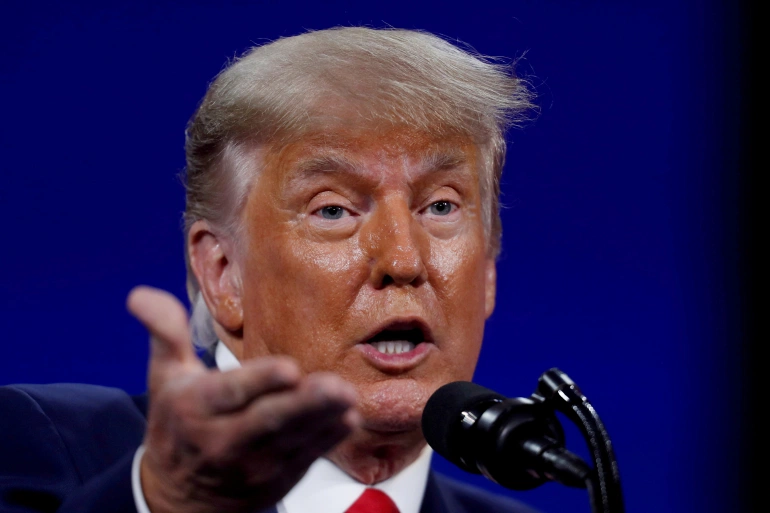The complicated matter of anti-Asian racism in the U.S
The group Stop AAPI Hate has logged nearly 4,000 hate incidents since March 2020, when the spread of COVID-19 was officially classified as a pandemic. Reactions to the shootings, especially from Asian Americans, pointed to the deep-seated anti-Asian racism in the U.S., and the long history of sexualization of Asian women.
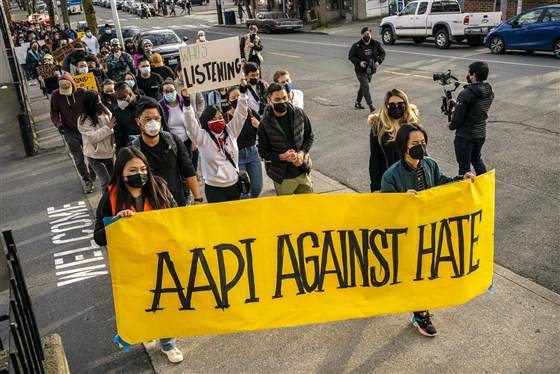 |
| Demonstrators march through the Chinatown-International District during a "We Are Not Silent" rally and march against anti-Asian hate and bias on March 13, 2021 in Seattle.David Ryder / Getty Images |
The PBS NewsHour’s Amna Nawaz spoke with “The Committed” author Viet Thanh Nguyen, who said Tuesday’s shootings are part of a wider pattern of anti-Asian violence.
The March 16 shootings may have come as a surprise to those who may not know much about the treatment of Asian Americans in the U.S., Nguyen said, but for “those of us familiar with Asian American history know that Asians have been targeted for violence in this country as long as there have been Asian immigrants in this country.”
In 1989, years before Columbine and other schools shootings made headlines, a gunman shot and killed five southeast Asian schoolchildren at an elementary school in Stockton, California. These children were targeted because they were Vietnamese and Cambodian refugees from the Vietnam War, Nguyen said.
“Asian Americans are often situated today, in contemporary discourse, as somehow being safe. We’re the ‘model minority.’ We are successful in college, et cetera, et cetera,” he said. “And people are not aware of the fact that there’s huge diversity in the Asian American population. There are a lot of poor Asian Americans, a lot of Asian Americans living in vulnerable economic situations, and they’re ripe for this kind of violence.”
Nguyen also said there’s violence beyond those kinds of circumstances, similar to the recent wave of documented anti-Asian incidents throughout the pandemic, that shows how anybody can be targeted.
“I think that’s an additional level of shock and visibility that we see — people like Asian American elders in Chinatown, in presumably safe environments, in their driveways in San Jose, being pushed, shoved, attacked, physically assaulted or at least verbally assaulted, is completely unacceptable, and the Asian American community, is absolutely right in being outraged about these things.”
Nguyen said Chinese immigrants were targeted in the 19th century because they were being positioned, by the media and politicians, as a threat to the white working class.
“That stimulation of anti-Asian feeling to distract attention away from economic fallout has always been a part of American history.”
In 1982, Vincent Chin was killed in Detroit by two white automakers who thought the Chinese American man was Japanese. The attackers blamed Chin for the Japanese economic competition taking place at the time, amid intense, heated rhetoric about a trade war with Japan, Nguyen said.
“We, as Asian Americans, have never been insulated from the entire anti-Asian feeling that the United States, every now and then, promotes towards Asian countries with which it builds competition,” he said.
Outside the domestic racism in the U.S., anti-Asian feeling, in general, throughout the nation is “stimulated by this kind of rhetoric,” he said, adding that the three successive administrations of former Presidents Barack Obama and Donald Trump, and now Joe Biden, have taken a stance of China as an enemy and major competitor.
While that rhetoric has varied, “I can’t help but feel that there is blowback coming from that stance against Asian Americans as a whole.”
“Bullies attack who they think are vulnerable, and we see this in our elderly and youth populations.”
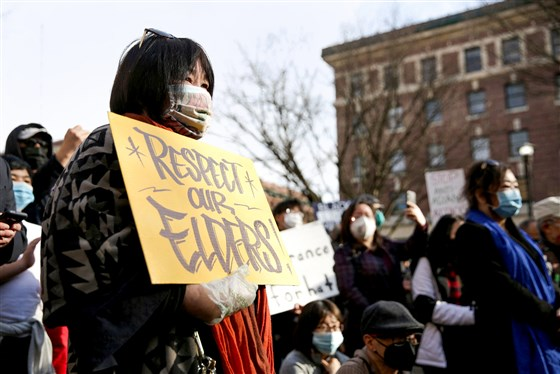 |
| A woman holds a sign that reads "Respect Our Elders" during the "We Are Not Silent" rally against anti-Asian hate in response to recent anti-Asian crime in the Chinatown-International District of Seattle on March 13, 2021.Jason Redmond / AFP - Getty Images |
According to the data, Asian women report hate incidents 2.3 times more than men. A further examination of the submitted reports showed that in many cases, the verbal harassment that women received reflected the very intersection of racism and sexism.
One Chinese American woman reported that a “man on the subway slapped my hands, threatened to throw his lighter at me, then called me a ‘c---- b----.’ He then said to ‘get the f--- out of NYC.’” Another woman, who’s Filipino American, reported that while in a Washington, D.C., metro station with her boyfriend, a man shouted "Chinese b----" at her, coughed at the couple and physically threatened them, according to NBC News.
Russell Jeung, professor of Asian American studies at San Francisco State University and the forum Stop AAPI Hate’s founder emphasized that women have always dealt with harassment from men and public safety issues more broadly. But the pandemic, he said, has provided another “excuse” for people to target Asian women.
“We've noticed that from the very beginning, it's been a real consistent pattern,” Jeung said. “Bullies attack who they think are vulnerable, and we see this in our elderly and youth populations.”
The wave of violence directed at Asian American seniors at the beginning of the year, particularly the graphic attacks that have been captured on video, have likely prompted more attention from both the community and mainstream media, Jeung said. And it’s galvanized a vocal response that’s likely led to more reporting.
While these attacks on elders have catalyzed calls for action, Jeung made a distinction between this particular violence, most of which has not been found to be explicitly racially motivated, and the racism those in the community have been facing due to the problematic link between the virus and Asian Americans.
“I think there are separate trends, the violence that we're seeing now and the racism we saw last year, but they are related,” Jeung said. “We're really careful to note that this violence against Asian Americans in high-crime neighborhoods has always been high. And so the combination of both the racism from last year and crimes against Asian elderly are now significant enough to get national attention.”
"We have all been targeted by long-distance racism"
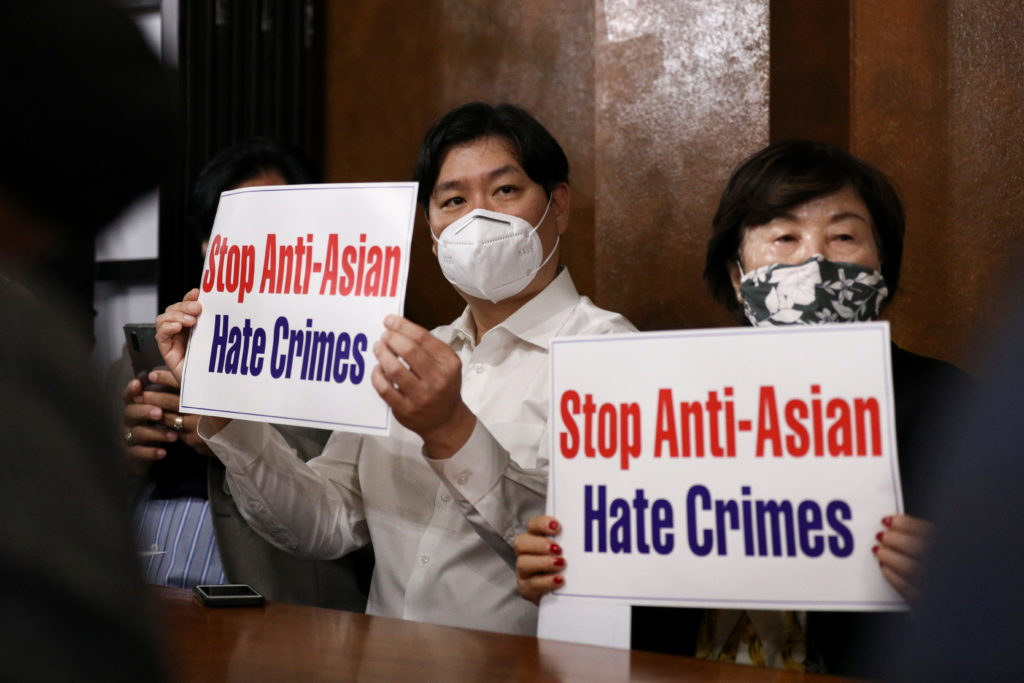 |
| Members of the Atlanta Korean American Committee against Asian Hate Crime show placards as they meet at Ching Dam, a Korean restaurant, after the fatal shootings at three Georgia spas, in Duluth, Georgia. Photo by Dustin Chambers/Reuters |
Nguyen said we’re in a “really, obviously tense environment because of the pandemic.”
“People are economically stressed or psychologically stressed and so on,” he said, adding that under the Trump administration, it was “free game” to describe COVID-19 as the “China virus and kung flu,” which places the onus on China for the origin of the virus and connects to the “deep well” of anti-Asian feeling.
“Everybody who is Asian in this country has heard this before. Even if you haven’t been a direct target of anti-Asian physical violence, we have all been targeted by long-distance racism,” he said.
Nguyen said growing up in the 1970s and ’80s, watching movies about the Vietnam War, the Vietnamese were depicted as people to be mocked and — before they were killed — to be silenced. That anti-Asian feeling is present throughout American pop culture, like in comedies and political discourse and radio “shock jock” commentary.
“There’s nothing new. ‘Kung flu’ just puts its finger on that button and presses it over and over and over again,” he said. “I think that was the immediate trigger for what we’re experiencing now.”
That low-level anti-Asian racism has always been with us, Nguyen said. Now, it’s part of our foreign policy discussion about China, “and everybody’s hearing and absorbing that feeling, that phobia against the Chinese because, presumably, all Asians look the same to a lot of non-Asian people. All Asians are targeted as a result of that,” he said.
Taking action on Anti- Asian racism
Public figures spanning civil rights activism, media, entertainment, sports and beyond reacted to the news this week and the general rise of anti-Asian racism in the past year. There are also a number of ways you can take action beyond denouncing anti-Asian violence.
For example, Stop AAPI Hate found from their data in the last year that businesses are the primary site of discrimination, where 35.4% of hate incidents were logged; 25.3% of reported incidents took place in public streets, followed by 9.8% that occurred in public parks. The coalition offers multilingual resources for those who experience or witness AAPI hate incidents to report it to the group. The coalition also provides safety tips for those encountering or witnessing hate incidents.
Importantly, experts have stressed the distinctions between what is a hate or bias incident (like a slur) and what is considered a hate crime (a physical act of violence that shows racial motivation). Experts say public mislabeling can have legal impact, from jury deliberation to a greater sentence for a suspect.
Advocacy groups like Asian Americans Advancing Justice offer bystander intervention training, which can be done virtually. Tran encourages people to seek out local grassroots justice organizations and mutual aid efforts to lend support in their own communities.
“Anti-racist education is not very strong in this country in general,” Nguyen said.
Some universities may have ethnic studies and anti-racist courses, but regarding the national discourse, “you can’t separate out what happens to Asian Americans, to what happens to Black people and to Indigenous people and so on and so forth.”
Russell Jeung said addressing the root cause of the violence requires more education, more expanded civil rights protections and more restorative justice models. The memorandum — which focuses on hate incidents, rather than hate crimes — allows for a more holistic approach to combating racism against Asian Americans in public streets, transit, private businesses and other settings, he said.
"If you just narrowly focus on hate crimes, you only address a sliver of the racism that Asian Americans are experiencing," Jeung said. "Biden's memo that actually addresses hate incidents rather than hate crimes is actually helpful, because that gives us the opportunity to frame the issue comprehensively."
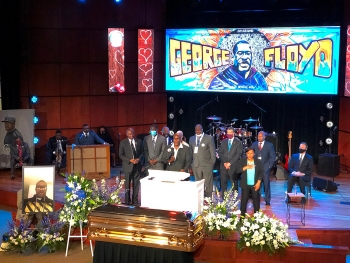 | Protests and riots in America update: Time to say goodbye to man whose death ignited racism matter Floyd’s mourners stand for 8 minutes, 46 seconds, White House fencing will stay up until June 10, troops moving away from Washington, National Guard helicopter had ... |
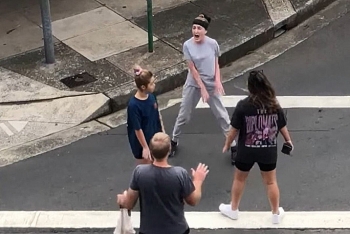 | Vietnamese nationals attacked in Australia in a racial abuse linked to Covid-19 Two Vietnamese-Australian sisters got into an unprovoked attack by two Australian teenagers while crossing the street in Petersham Road for “being Asians who spread the ... |
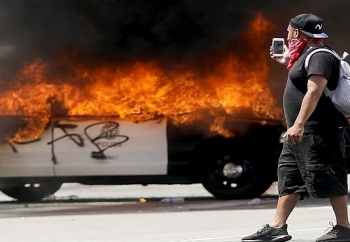 | George Floyd death: More than 12 cities defied curfews in US More than 12 cities impose curfews caused chaos and fury across the US as US anti-racism protests began since George Floyd's death. |
Recommended
 World
World
Pakistan NCRC report explores emerging child rights issues
 World
World
"India has right to defend herself against terror," says German Foreign Minister, endorses Op Sindoor
 World
World
‘We stand with India’: Japan, UAE back New Delhi over its global outreach against terror
 World
World
'Action Was Entirely Justifiable': Former US NSA John Bolton Backs India's Right After Pahalgam Attack
 World
World
US, China Conclude Trade Talks with Positive Outcome
 World
World
Nifty, Sensex jumped more than 2% in opening as India-Pakistan tensions ease
 World
World
Easing of US-China Tariffs: Markets React Positively, Experts Remain Cautious
 World
World

